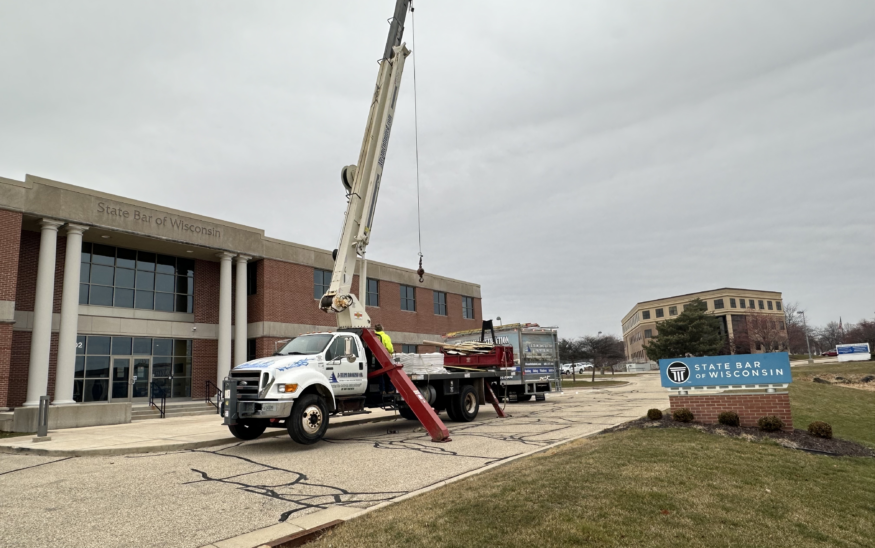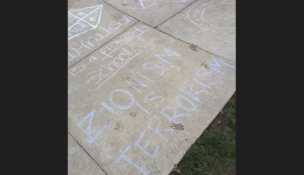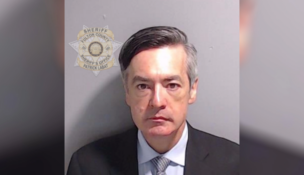WILL says ‘another lawsuit possible’ after settlement with State Bar
By: Steve Schuster, [email protected]//April 9, 2024//
WILL says ‘another lawsuit possible’ after settlement with State Bar
By: Steve Schuster, [email protected]//April 9, 2024//
Published April 9, 2024 at 8:30 a.m. CDT. Last updated 10:15 a.m. CDT on April 9, 2024.
The State Bar of Wisconsin received a letter Tuesday morning from attorneys at Wisconsin Law and Liberty, according to counsel from WILL who noted future litigation is anticipated against the Wisconsin State Bar if it fails to comply with the terms of the settlement agreement.
The letter was in response to the State Bar‘s allegedly false statements made that State Bar’s Diversity program would be unchanged.
“Certain comments being made by the State Bar in the wake of the settlement in the Suhr matter have come to my attention. The Bar is apparently taking the position that its diversity clerkship program will “continue unchanged.” For the Bar’s sake, I certainly hope not. The State Bar is both constitutionally and statutorily forbidden from using race as a factor in selecting students for clerkships,” wrote Rick Esenberg, president and general counsel for the Wisconsin Institute for Law & Liberty in the letter to the State Bar.
“The State Bar of Wisconsin’s Diversity Clerkship Program will continue UNCHANGED,” the State Bar posted on X (formerly known as Twitter) on Monday.
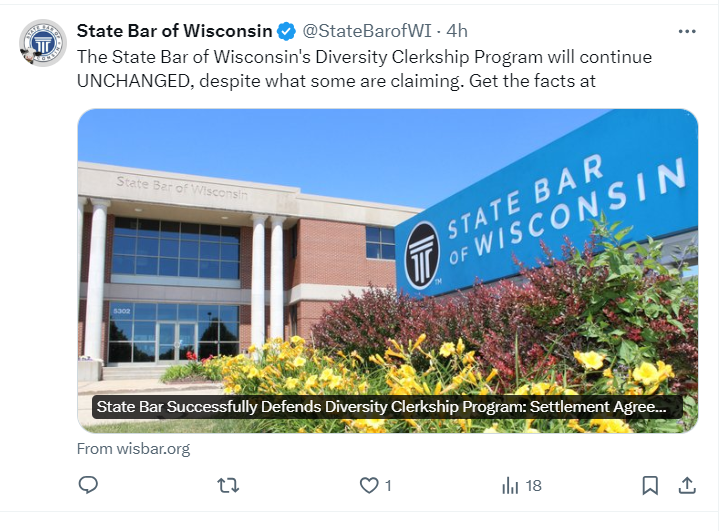
In response, Esenberg wrote, ” ‘Unchanged’ would not seem to be an accurate description of this change. But if that’s all that happened, this letter might be unnecessary.”
According to the terms of the settlement, the State Bar had agreed to change its definition of diversity.
“The new definition, which the bar has agreed to, expressly states that decisions will be made “without regard to stereotypes,” Esenberg added.
Esenberg continued, “So, no, the bar is not going to proceed ‘unchanged.’ That is particularly so in light of this morning’s statement. It has all but announced its intent to break the law by suggesting that the characteristics that it will consider are those that are legally forbidden. This morning’s statement will be Exhibit A in any ensuing litigation.”
Mischaracterization
Attorneys for WILL say that the State Bar of Wisconsin has mischaracterized the terms of the settlement agreement in statements made to the Wisconsin Law Journal, on social media as well as on the State Bar’s own website.
“Perhaps the Bar is permitted to mischaracterize the settlement and even the Constitution,” Esenberg wrote in the letter.
During an interview with the Wisconsin Law Journal on Tuesday morning, attorneys for WILL elaborated on the statements in the letter.
When asked by the Wisconsin Law Journal if the State Bar intentionally lied and deceived members, WILL responded, “The bar’s purpose is to regulate and improve the legal profession. The bar’s attempt to save face is not germane to either. These mischaracterizations, whatever the intent behind them, do not serve the profession—or the public.”
In anticipation of more litigation
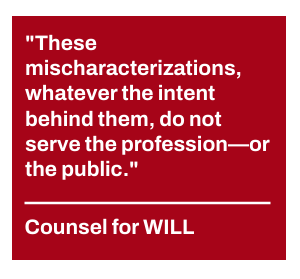
Attorneys for WILL said they are considering seeking additional legal remedies against the State Bar of Wisconsin to make sure it follows the spirit of the settlement agreement.
“We may go to court to enforce the settlement agreement,” counsel for Will said Tuesday.
“Additionally, there are many attorneys in Wisconsin who could copy and paste the complaint and file another lawsuit,” WILL attorneys noted.
“Given the bar’s statements, another lawsuit is possible — maybe even likely. We hope that the bar will work with us to correct its illegal behavior so that further legal action is not necessary. The bottom line is, the bar is not off the hook yet,” attorneys for WILL added.
Freedom of the Press
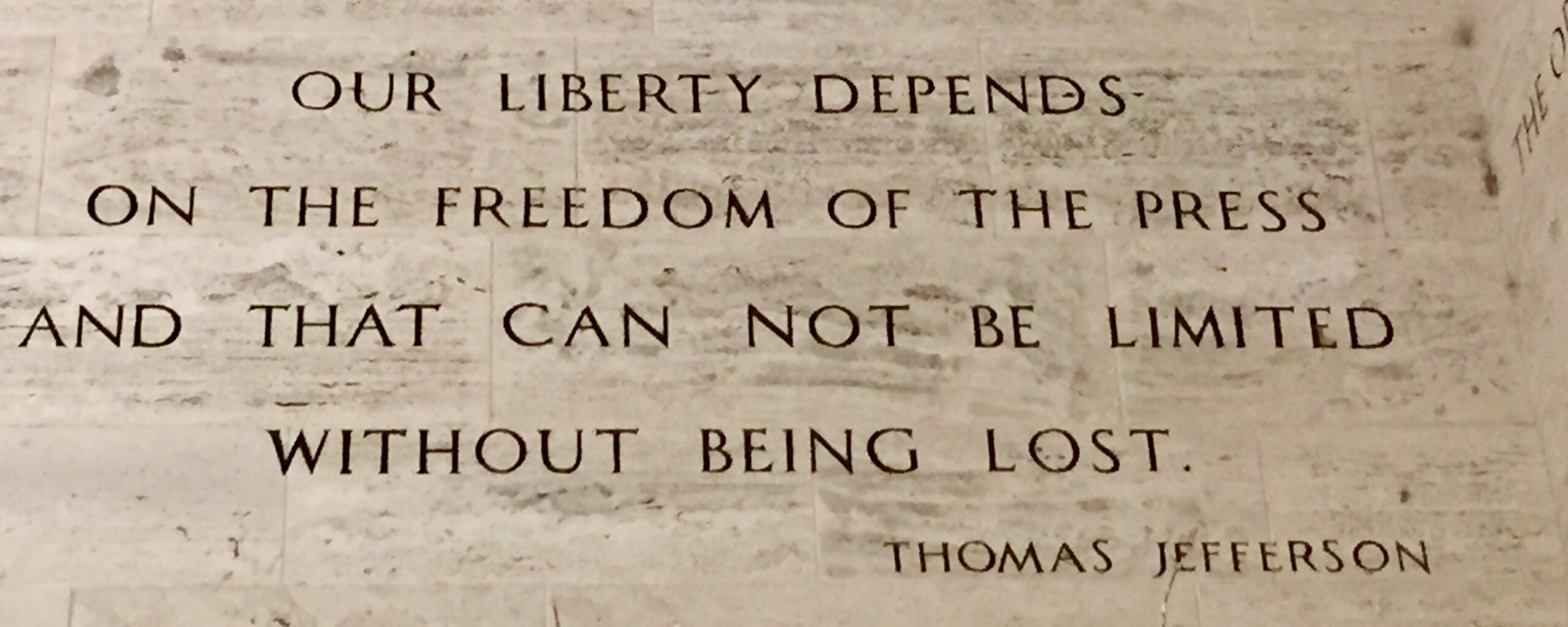
Last week, staff at the State Bar of Wisconsin demanded the Wisconsin Law Journal take down an article that contained attributed statements made by opposing counsel (WILL) in the recent lawsuit against them. The Wisconsin Law Journal denied the State Bar of Wisconsin’s request to take down the story and asked the State Bar to provide a response to WILL’s comments, which were immediately added to the article. In response, attorneys for WILL addressed this in Monday’s letter.
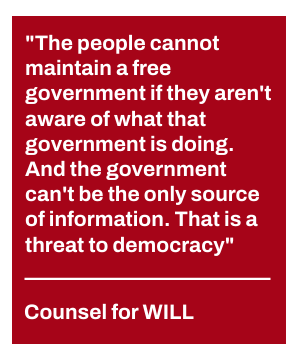
During Tuesday’s interview with the Wisconsin Law Journal, counsel for WILL noted, “The State Bar is a state actor. It, therefore, must respect the freedom of the press.”
“Although it is probably permitted to express a different view, it cannot engage in viewpoint discrimination. It cannot squash stories just because it does not like them. The people cannot maintain a free government if they aren’t aware of what that government is doing. And the government can’t be the only source of information. That is a threat to democracy,” WILL attorneys said Tuesday.
In Tuesday’s press release, WILL wrote, “WILL has learned that the Bar attempted to intimidate a member of the media for reporting WILL’s perspective on the settlement, which raises serious First Amendment questions.”
Will also wrote in the press release, “The First Amendment demands much more. If we are to have a free press, as guaranteed by the Constitution, then State Bar employees may not bully and intimidate reporters, as they have here. “
In Tuesday’s letter to the State Bar, WILL counsel further argued the State Bar should not “intimidate those with a different view.”
“If we are to have a free press, as guaranteed by the Constitution, then State Bar employees may not bully and intimidate reporters, as they have here,” WILL wrote in the press release.
Also on Tuesday morning, the State Bar of Wisconsin issued a statement to the Wisconsin Law Journal.
“All first-year law students are eligible for the Diversity Clerkship Program. Race has not and is not used as a factor in making decisions about program applicants. This is what the State Bar has tried to explain to WILL all along, even prior to the filing of their federal lawsuit in December. WILL’s press release about the settlement suggested the State Bar was abandoning the program. The State Bar’s response was to clear the record and let members know the Diversity Clerkship Program is continuing, despite WILL’s communications about the program,” the State Bar said.
“The State Bar contacted the Wisconsin Law Journal to update the article with proper attribution to statements made by WILL, and to include the State Bar’s responses. The Wisconsin Law Journal did so in an updated version of the story,” the State Bar added.
Both sides (WILL and the State Bar) are claiming a victory in the recently achieved settlement.
On Monday, the State Bar of Wisconsin published an article ‘State Bar Successfully Defends Diversity Clerkship Program: Settlement Agreement Explained.”
The article begins with “FACT: The State Bar of Wisconsin’s Diversity Clerkship Program will continue unchanged, despite what the Wisconsin Institute for Law and Liberty (WILL) is publicly claiming. WILL’s most recent headline says, “Victory: State Bar Abandons DEI Program After WILL Lawsuit,” suggesting the Diversity Clerkship Program will not continue or is suspended. In fact, the State Bar’s Diversity Clerkship Program is continuing without any change in its operation. The only change is the wording of the definition of “diversity.” This article provides facts on the settlement agreement.”
However, WILL contends that that was not at all what was in the spirit of the settlement agreement.
On April 4, WILL published a statement, “Victory: State Bar abandons DEI Program after WILL lawsuit.
As previously reported by the Wisconsin Law Journal, on Thursday, the State Bar of Wisconsin and the Wisconsin Institute for Law & Liberty (WILL) reached a partial settlement agreement.
However, it would appear there is not a meeting of the minds as to what the settlement actually means.
On Thursday, a WILL spokesperson said the settlement is effectively “ending discriminatory DEI practices at the State Bar.”
However, in response, the State Bar of Wisconsin said, “The State Bar’s Diversity Clerkship program does not discriminate based on race. There were no discriminatory practices to begin with, which the settlement acknowledges. Nothing about the program is changing besides a change to the definition of ‘diversity.’ The Diversity Clerkship Program will continue unchanged under the settlement.”
“Now, our client’s mandatory and annual State Bar dues will not fund internships and policies primarily based on race, but rather on merit and diversity of viewpoint,” WILL officials added.
In response, the State Bar of Wisconsin said, “The State Bar does not fund internships or policies based on race. The Diversity Clerkship Program does not discriminate based on race, which the settlement agreement acknowledges.”
“Defeating unconstitutional DEI programs has become WILL’s area of expertise, and we are not stopping here. While we are pleased with this victory, we know the fight is far from over. In fact, this is only the beginning of a movement, and our lawsuit will provide a roadmap for future victories in all 50 states,” said WILL Associate Counsel, Skylar Croy.
The State Bar responded, “The State Bar’s Diversity Clerkship Program is not unconstitutional, which is why the program will continue to operate unchanged. The only change is the updated definition of “diversity” on the program webpage and other Diversity Clerkship Program materials. The settlement, and the dismissal of claims against the Diversity Clerkship Program, acknowledges that WILL now understands that the State Bar’s Diversity Clerkship Program fully complies with the law.”

WILL’s client, Attorney Daniel Suhr, added, “Premier internship opportunities should be available to students based on merit — not race. I am proud to partner with WILL to set a strong precedent for the next generation of law students.”
Several University of Wisconsin-Madison law students commented on the settlement.
“This settlement brings a much-needed change to the Diversity Clerkship Program as it will now give all law students an equal opportunity. Diversity programs must consider much more than one’s race and sex in their candidate evaluations. True diversity lies within one’s individual experiences and the unique perspectives one can offer,” said UW Law Student Samatha Crane.
UW Law Student George Clark agreed.
“This settlement offers all students — regardless of race — a fair shot at competitive opportunities. There is much work to do, but I am optimistic the Wisconsin State Bar will follow the law. Hopefully, the Bar will care more about having greater diversity of thought rather than hitting quotas,” Clark said.
According to WILL, under the terms of the settlement, the State Bar of Wisconsin will open its Diversity Clerkship Program to all first-year law students attending either Marquette University Law School or the University of Wisconsin Law School who are in good standing. All promotional, explanatory, or other materials created by the State Bar must clearly state that such students are all eligible to participate in the Diversity Clerkship Program regardless of race.
The State Bar responded, “The State Bar is not suddenly opening the Diversity Clerkship Program to all first-year law students at both law schools. The Diversity Clerkship Program has always been open to all first-year law students at both law schools who are in good standing. The settlement changed nothing in terms of eligibility.”
Also according to WILL, the State Bar cannot state, suggest or insinuate in its promotional materials that only law students from diverse backgrounds, with backgrounds that have been historically excluded from the legal field, or who have been socially disadvantaged are eligible. The State Bar will also adopt a new definition of the term “diversity.” This was the bar’s old definition, which was the basis for the lawsuit:
The term ‘diversity’ has a dynamic meaning that evolves as the demographics in the state change. It is an inclusive concept that encompasses, among other things, race, ethnicity, national origin, religion, gender, gender identity, age, sexual orientation and disability. Inclusion helps to create a culture that embraces people from the widest range of talent and experience and promotes understanding and respect for all people and different points of view in the legal profession.
In accordance with the settlement, this new definition will apply to the Diversity Clerkship Program:
‘Diversity’ means including people with differing characteristics, beliefs, experiences, interests, and viewpoints. Diversity promotes an environment in which all individuals are treated with dignity and respect, regardless of their differences and without regard to stereotypes, and helps to ensure a better understanding and consideration of the needs and viewpoints of others with whom we interact.
The State Bar must prominently display this new definition on the main webpage for the Diversity Clerkship Program.
WILL officials noted, though a settlement has been reached, the case will continue on other legal aspects. WILL is still challenging how the State Bar collects dues from all its members.
The State Bar of Wisconsin on Thursday issued a statement telling a different story.
“The State Bar of Wisconsin has reached a settlement regarding its Diversity Clerkship Program, which was challenged in federal court. The Wisconsin Institute for Law and Liberty (WILL) has agreed to dismiss this portion of the lawsuit after a clarification in the State Bar’s definition of ‘diversity,'” the State Bar wrote in Thursday’s statement.
“The settlement clarifies the definition of ‘diversity’ but makes no changes to the program,” said State Bar Executive Director Larry J. Martin.
“The Diversity Clerkship Program, which has been creating opportunities for Wisconsin-based law students for three decades, will continue to exist and to operate in its current form,” Martin added.
According to the State Bar of Wisconsin, in December 2023, WILL filed a federal lawsuit in the U.S. District Court for the Eastern District of Wisconsin on behalf of attorney Daniel Suhr. The lawsuit alleged that the State Bar’s Diversity Clerkship Program is unconstitutional because it discriminates between students based on race.
“However, the Diversity Clerkship Program does not discriminate between students based on race,” the State Bar of Wisconsin contends.
In response to the lawsuit, Martin said the organization would vigorously defend the program in federal court. Now that part of the litigation will be dismissed, pending the court’s approval.
According to the State Bar, the old definition of diversity stated: “The term ‘diversity’ has a dynamic meaning that evolves as the demographics in the state change. It is an inclusive concept that encompasses, among other things, race, ethnicity, national origin, religion, gender, gender identity, age, sexual orientation and disability. Inclusion helps to create a culture that embraces people from the widest range of talent and experience and promotes understanding and respect for all people and different points of view in the legal profession.”
Also according to the State Bar of Wisconsin, under the settlement, the new definition states: “Diversity means including people with differing characteristics, beliefs, experiences, interests, and viewpoints. Diversity promotes an environment in which all individuals are treated with dignity and respect, regardless of their differences and without regard to stereotypes, and helps to ensure a better understanding and consideration of the needs and viewpoints of others with whom we interact.”
According to the State Bar of Wisconsin, the State Bar’s Diversity Clerkship Program facilitates paid summer internships at private law firms, corporate legal departments, and governmental agencies in Wisconsin that choose to participate by coordinating opportunities for applicants to the Program to meet, interview, and be connected with those employers who participate in the Program.
“Despite the pendency of litigation, students and employers have signed on for the 2024 program, providing these learning and training experiences for both, just as it has for more than 30 years,” the State Bar of Wisconsin said.
As previously reported by the Wisconsin Law Journal, the State Bar of Wisconsin’s diversity efforts don’t exactly make Dr. Martin Luther King Jr.’s dream a reality, according to University of Wisconsin-Madison clinical law professor Steven Wright who serves faculty advisor to the school’s Black Law Student Association.
Wright sent a scathing email to UW Law students over Christmas break warning students not to participate in the State Bar of Wisconsin’s Diversity Clerkship “Sh*tty program,” that has been recently subject to a Federal Lawsuit.
“I strongly encourage you not to participate in this sh*tty program that rarely admits people who look like us and that will no doubt share all your private information with plaintiffs hostile to your interests,” Wright wrote in his December 2023 email.
In Wright’s email to students he noted the State Bar of Wisconsin’s 2023 diversity clerkship program accepted 25 members, only one of whom was a black UW law student.
As previously reported by the Wisconsin Law Journal, a federal lawsuit over a State Bar of Wisconsin diversity program was filed in the Eastern District of Wisconsin in December of 2023, according to court documents obtained by the Wisconsin Law Journal.
The Wisconsin Institute for Law & Liberty (WILL) argued the State Bar of Wisconsin’s promotion of alleged discriminatory DEI practices, including its flagship “Diversity Clerkship Program,” is unconstitutional because it discriminates on the basis of race, an issue that has come into the spotlight in the wake of a U.S. Supreme Court ruling last summer.
In its lawsuit, WILL argued the State Bar of Wisconsin requiring attorneys to fund DEI is unconstitutional, just as the U.S. Supreme Court recently ruled the same is true prohibiting affirmative action in college admissions at the University of North Carolina and Harvard.

“One of the inherent ironies of DEI, in its push to create a more inclusive community, ends up excluding people,” said plaintiff and Attorney Daniel Suhr during an interview with the Wisconsin Law Journal in December. “In a push for inclusion based on race, it ends up excluding people that come from a different race, religious background or different point of view.”
In a 2022 report, The Anti-Defamation League said, “Jews are being excluded from DEI strategies, despite facing growing rates of antisemitism in the workplace and beyond.”
Suhr, who is represented by WILL’s legal team, agreed.
“All we do is create winners and losers based on the people we do and don’t like. Some races are privileged, and others are excluded. Being Jewish is a minority, but it’s not one of the attributes being preferred by these programs,” Suhr said.
The State Bar member dues-funded program features exclusive legal internship opportunities to only some minority law students or those who self-identify as LGBTQ+, the lawsuit contends.
Larry J. Martin, executive director of the State Bar of Wisconsin, defended the program.
“The State Bar of Wisconsin’s Diversity Clerkship Program is designed to assist first-year law students who attend the University of Wisconsin or Marquette University law schools by creating opportunities for introductions to private law firms, corporate legal departments, and governmental agencies that participate in the program,” Martin said in a statement. “Neither race nor ethnicity is an eligibility factor or requirement for purposes of participation.
“The State Bar is now aware of a lawsuit filed against the State Bar, targeting the Diversity Clerkship Program and other State Bar activities,” Martin added. “The State Bar will vigorously defend the Diversity Clerkship Program, as the organization has long considered the program an important tool to support Wisconsin law school students.”
Plaintiff’s counsel further argues attorneys have a role and responsibility to uphold the rule of law and need to remember the oath they have taken to defend the constitution of the United States. Attorneys for WILL say the State Bar is in violation of the First and 14th Amendments, as well as 42 U.S.C. § 1983.
“The State Bar of Wisconsin’s DEI program is illegal because we all have a right to be treated as individuals,” Suhr said, noting how the internship rules have a similar standard.
“The State Bar’s attitude of how much we can get away with is the wrong attitude. The point of this lawsuit is you can’t get away with this any longer. You have to follow the constitution,” Suhr said.
In taking issue with State Bar of Wisconsin’s mandatory membership requirement, Suhr noted more than a dozen other states stopped requiring attorneys to join as a result of litigation.
“I’ve always been an opponent of mandatory bar membership. Free speech and association are core First Amendment values,” said Suhr.
Suhr asked why should Wisconsin lawyers be forced to subsidize the speech of this trade association?
Courts have said the role of the State Bar is to improve legal services and regulate the profession. Noting the uniqueness of Wisconsin’s legal system, Suhr said the State Bar doesn’t regulate attorney conduct and is now side-tracked with DEI and marketing rather than prioritizing moving the profession forward as prescribed by the courts.
“Regulation is the job of OLR, the office of lawyer regulation, the State Bar doesn’t even do that,” Suhr noted.
“Really, the State Bar’s only role is what the Supreme Court has said is to improve quality of legal services,” Suhr added.
“I really don’t think the State Bar speaking about political and culture issues or marketing products checks off any of the boxes that the Supreme Court has drawn,” Suhr said.
Court documents provided several examples of his argument.

Suhr said there is bipartisan support from both liberals and conservatives to get rid of a mandatory bar requirement across the nation.
“Black and Douglas, two liberals, civil liberties champions, worried about the civil liberties implication of coercing lawyers to be involved with organizations they don’t agree with,” he said.
Not fair to Wisconsin Lawyers?
“One of the things that’s so frustrating is how unique the State Bar of Wisconsin is in comparison to other professions. If you’re a doctor you don’t have to join medical society, it’s private trade association. There is only a fee paid to the examining board. The same is true for dentists, engineers and every other professional in the state of Wisconsin who is licensed, except lawyers,” Suhr said.
“We (lawyers) we are compelled by the law to subsidize an organization we don’t want to join. That organization uses our money to do things blatantly contradictory to our values. And there is nothing we can do about if we want to continue practicing in our profession in Wisconsin” he noted.
“There is a better way. It doesn’t have to be this way. We can respect people’s First Amendment rights and still protect consumers from unethical behavior,” Suhr added.
Additionally, according to court documents, the State Bar of Wisconsin is allegedly violating Wisconsin attorneys First Amendment right to free speech under Keller v. State Bar of California, in which the United States Supreme Court held that an association like the bar cannot compel an objecting member to fund activities that are not “germane” to a constitutionally permissible justification for mandatory membership. 496 U.S. 1, 13–14 (1990).
The lawsuit further argues the State Bar of Wisconsin engages in several other non-germane activities to which the plaintiff objects.
“Like the program, some of these activities include divisive rhetoric. For example, the bar lambasts police on its website, claiming that “[b]lack Americans suffer from police brutality . . . caused by systemic racism . . . that is ingrained in our legal system. . . . This is unacceptable. Black Lives Matter.” Ex. 7:1.[1] Plaintiff does not want to help spread or be associated with this speech,” Court documents state.
Some of the named defendants in the lawsuit include:
- Dean Dietrich – president State Bar of Wisconsin
- Jane Ellen Bucher – president-elect
- Margaret Wrenn Hickey – past-president
- Frances Coyer Munoz – secretary
- Deanne M. Koll – treasurer
- Joseph Cardamone III – chairperson of the Bar Board of Governors
- Larry Martin – executive director
The lawsuit also contends that minority law students disclosed their status on their law school entrance personal statements, which was later illegally used to get preferential treatment during internship selection, as it was reviewed on interview evaluation forms.

“The program discriminates against law students based on unlawful classifications, thereby violating those students’ rights secured by the Equal Protection Clause of the 14th Amendment. Plaintiff cannot be compelled to support an unconstitutional program,” counsel argues in court documents.
WILL Associate Counsel Skylar Croy said, “When the government discriminates based on race, it sows more division in our country and violates the Constitution in the process. WILL is standing up against discrimination and holding the State Bar accountable to the rights of its due-paying members.”
WILL and Croy represent Suhr, who said no one should receive preferential treatment.
“Internships are competitive — as they should be. But when one group is given preferential treatment over the other to apply for these programs, the programs lose competitiveness and hurt all Americans. This also goes against my beliefs entirely. The State Bar should do better and expand these opportunities to all Wisconsin law students,” Suhr said.
According to court documents, State Bar dues allegedly illegally fund the minority favored internship. Legally, according to court documents, the internship should be open to everyone, regardless of one’s race or sexual orientation.
More than 600 law students have secured paid internships since the program’s inception.
Croy said he believes since the program’s inception in 1993, the State Bar has strayed from its original intention.
“To give the bar credit, at least when this was started there were good intentions, but even good intentions don’t lead to good outcomes,” he said.
The current DEI programs and communications efforts discriminate against the plaintiff and hundreds of other Wisconsin attorneys, court documents allege.
Reverse Discrimination?
Quoting former U.S. Supreme Court Justice Antonin Gregory Scalia, “We are all one race here, we are all Americans,” Suhr said are words that should ring true today.
“Pursuing of DEI agenda is about marking people off, treating people differently. There are equally students who are denied career opportunities because of race. I think it’s unconstitutional and I think it’s just wrong,” he added.
“As a lawyer I should not be forced to subsidize an unconstitutional program that is contrary to my beliefs and values. I believe that fundamentally the 14th Amendment was drafted to move us toward a color-blind society. From the government’s perspective in particular, it is both good policy and constitutionally the right thing to do to treat people equally regardless of race,” Suhr said.
During interviews with the Wisconsin Law Journal on Tuesday, both Suhr and Croy noted some of Wisconsin’s largest law firms, companies and government agencies participate in the “Diversity Clerkship Program,” program, including Froedtert Health and the Kohler Co.
“Some employers are using this as a way to engage in illegal affirmative action employment practices,” Croy said, noting he is not suing any of the companies.
“We’re not suing any of these companies. We are suing the State Bar of Wisconsin because they are the ones who facilitate and administer the program. They are the ones violating our civil rights,” Croy added.
In the current matter before the court, WILL argues in court documents that, “Using the funds of due-paying members to provide invaluable internship experiences to only some law students is a violation of the Constitution and the recent precedent set in Students for Fair Admissions v. Harvard. Judge Carl Ashley, who has promoted the program on behalf of the bar, stated that he was aware diversity programs like Diversity Clerkship Program could face legal challenges,” WILL officials noted.
According to Croy, some minorities who were initially supportive of DEI initiatives have since changed their position.
“University of Wisconsin Law School even received complaints from minority law students, they were coerced and pigeonholed,” Croy said.
“They were offended by this. They complained they were being asked different questions,” he added, noting, “We believe that people are supposed be judged based on their merit and their ability to solve problems. When you have programs that are handing out employment opportunities at critical stages, it’s a pretty big deal to get a paid internship, not based on merit, but based on protected traits, it is troubling,” he added.
WILL attorneys said they hope the court compel the State Bar of Wisconsin to end its alleged discriminatory program, or not allocate mandatory bar members’ dues to the program, or not require mandatory bar membership in Wisconsin.
The lawsuit is part of WILL’s nationwide Equality Under the Law Project. Since 2021, WILL attorneys have represented 53 clients in 18 states. All clients are represented pro bono. Click here to learn more.
This story has been updated.
Legal News
- Protests erupt on college campuses throughout Midwest, and U.S. over war in Gaza
- Newly filed report with federal court seeks Havana Syndrome transparency
- Questions of transparency, leadership responsibility linger over State Bar trust
- Firm demands $4.3M in dispute with Wisconsin client
- Chesebro among those charged with interfering in 2020 election
- Williams-Sonoma must pay almost $3.2 million for violating FTC’s ‘Made in USA’ order
- Harvey Weinstein due back in court, while a key witness weighs whether to testify at a retrial
- Flight attendant indicted in attempt to record minor in airplane bathroom
- Wisconsin attorney loses law license, ordered to pay $16K fine
- Former Wisconsin police officer charged with 5 bestiality felony counts
- Judge reject’s Trump’s bid for a new trial in $83.3 million E. Jean Carroll defamation case
- Dozens of deaths reveal risks of injecting sedatives into people restrained by police
WLJ People
- Power 30 Personal Injury Attorneys – Russell Nicolet
- Power 30 Personal Injury Attorneys – Benjamin Nicolet
- Power 30 Personal Injury Attorneys – Dustin T. Woehl
- Power 30 Personal Injury Attorneys – Katherine Metzger
- Power 30 Personal Injury Attorneys – Joseph Ryan
- Power 30 Personal Injury Attorneys – James M. Ryan
- Power 30 Personal Injury Attorneys – Dana Wachs
- Power 30 Personal Injury Attorneys – Mark L. Thomsen
- Power 30 Personal Injury Attorneys – Matthew Lein
- Power 30 Personal Injury Attorneys – Jeffrey A. Pitman
- Power 30 Personal Injury Attorneys – William Pemberton
- Power 30 Personal Injury Attorneys – Howard S. Sicula
